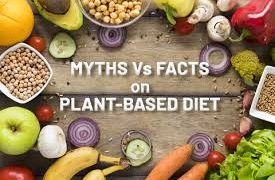Plant-based diets are growing in popularity for their health benefits, environmental impact, and ethical considerations. However, there are many myths and misconceptions surrounding this way of eating. Let’s separate fact from fiction and explore what a plant-based diet really means.
Myth 1: Plant-Based Diets Lack Protein
Fact: Plants provide plenty of protein. Foods like beans, lentils, chickpeas, tofu, tempeh, quinoa, nuts, and seeds are excellent sources. Combining different plant proteins throughout the day ensures you get all essential amino acids.
Myth 2: You Can’t Build Muscle on a Plant-Based Diet
Fact: Many athletes and bodybuilders thrive on plant-based diets. With proper nutrition and sufficient calories, muscle growth and recovery are totally achievable without animal products.
Myth 3: Plant-Based Means Vegan Only
Fact: Plant-based eating emphasizes whole, minimally processed plant foods but doesn’t necessarily exclude all animal products. Some people follow a flexitarian or vegetarian approach, including occasional dairy, eggs, or fish.
Myth 4: It’s Expensive and Hard to Follow
Fact: While some specialty products can be pricey, a basic plant-based diet built around beans, rice, seasonal vegetables, and fruits can be affordable and simple to prepare.
Myth 5: You Can’t Get Enough Iron and B12
Fact: Plant foods contain iron, but it’s less easily absorbed than from meat. Eating vitamin C-rich foods with iron sources boosts absorption. Vitamin B12 is not naturally present in plants but can be obtained from fortified foods or supplements.
Myth 6: Plant-Based Diets Are Bland and Boring
Fact: Plant-based cooking is rich with flavors, spices, and global cuisines. From vibrant salads to hearty stews and delicious desserts, there’s a vast variety of tasty options.
Benefits of a Plant-Based Diet
- Improved heart health
- Lower risk of diabetes and certain cancers
- Better weight management
- Reduced environmental footprint
- Ethical treatment of animals
Tips for a Balanced Plant-Based Diet
- Include a variety of whole grains, legumes, fruits, vegetables, nuts, and seeds.
- Plan meals to cover all nutrient bases, especially protein, iron, calcium, and B12.
- Experiment with herbs and spices to enhance flavor.
- Stay hydrated and enjoy whole, minimally processed foods.
Conclusion
Plant-based diets offer incredible benefits but come with some common myths that shouldn’t hold you back. With the right knowledge and planning, you can enjoy a nutritious, delicious, and sustainable way of eating that supports your health and the planet.

































































